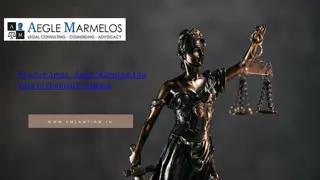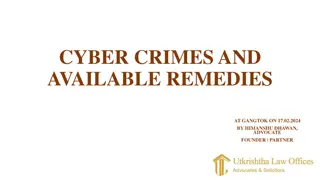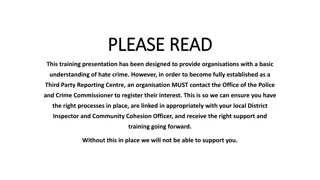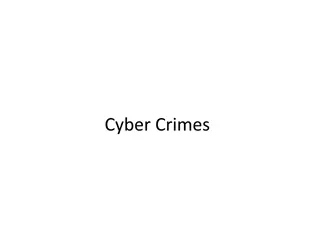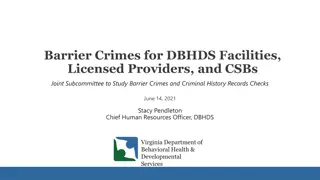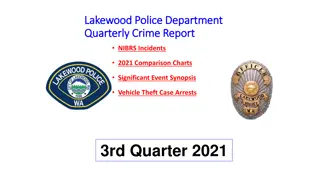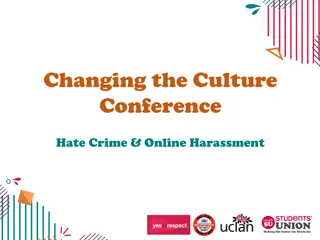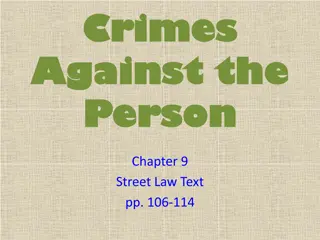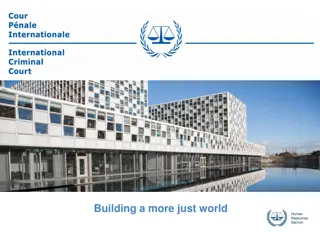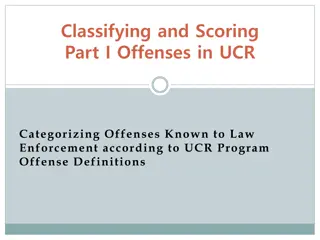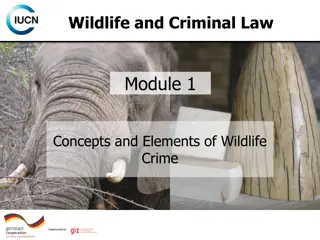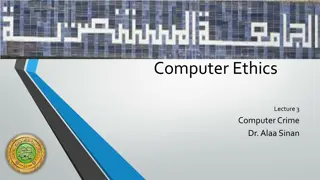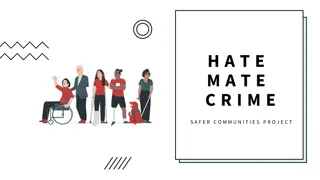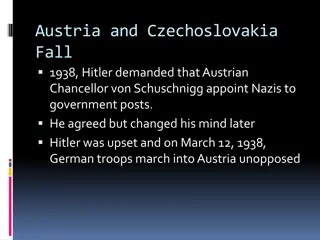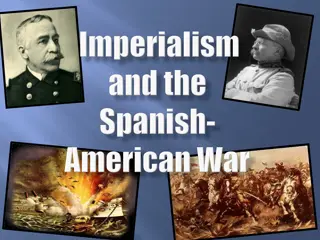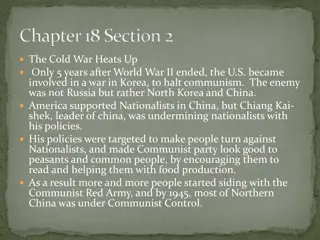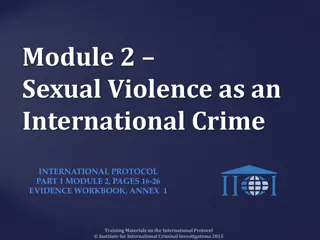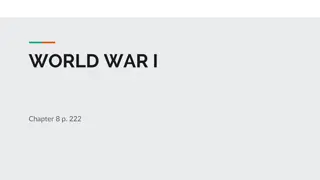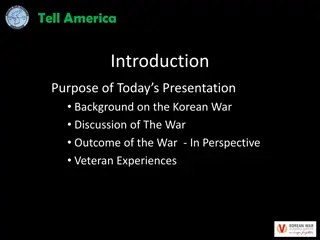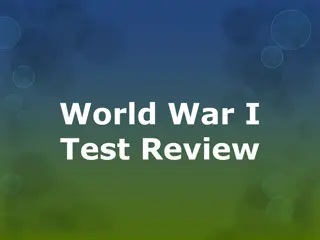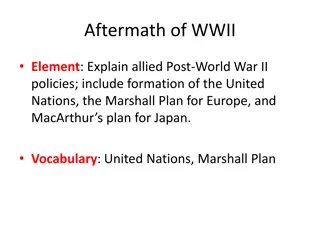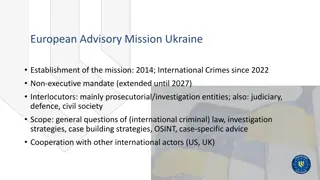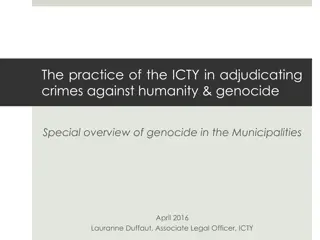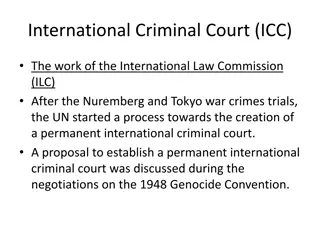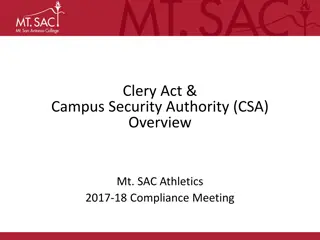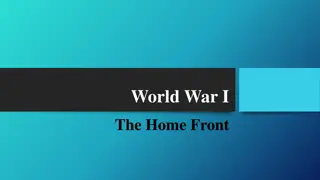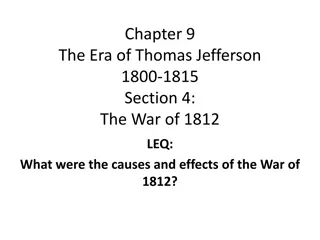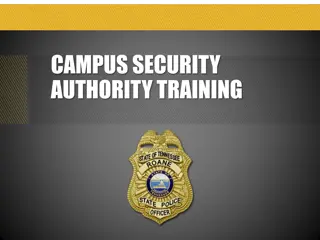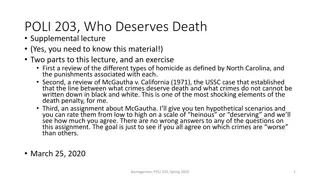❤[PDF]⚡ Civil War Talks: Further Reminiscences of George S. Bernard and His Fel
\"COPY LINK HERE ; https:\/\/getpdf.readbooks.link\/0813931754\n\nRead ebook [PDF] Civil War Talks: Further Reminiscences of George S. Bernard and His Fellow Veterans (A Nation Divided: Studies in the Civil War Era) | Civil War Talks: Further Reminiscences of George S. Bernard and His Fellow Vetera
1 views • 6 slides
Prevention and Combating of Hate Crimes and Hate Speech Bill [B.9B.2018]
The Prevention and Combating of Hate Crimes and Hate Speech Bill aims to address incidents motivated by prejudices through the creation of offenses of hate crimes and hate speech. It seeks to prevent and combat these offenses by defining hate crimes, hate speech, and establishing measures for prosec
1 views • 18 slides
Practice Areas - Aegle Marmelos Law Firm in Chennai & Madurai
Practice Areas - Aegle Marmelos Law Firm in Chennai & Madurai\n\n\u2022\tCriminal:\nViolent crimes (murder, assault)\n\u2022\tSexual offenses (rape, harassment)\n\u2022\tProperty crimes (theft, burglary)\n\u2022\tFinancial crimes (fraud, embezzlement)\n\u2022\tCybercrimes (hacking, online fraud)\n\u
0 views • 4 slides
Understanding Cyber Crimes and Remedies in Gangtok by Himanshu Dhawan
Explore the world of cyber crimes and available remedies as presented by Advocate Himanshu Dhawan. Learn about different categories of cyber crimes, examples of financial and non-financial cyber crimes, data theft, and relevant sections of the IT Act, 2000. Gain insights into unauthorized access, da
1 views • 9 slides
Understanding Hate Crime: Training and Reporting
Gain insights into hate crimes, definitions, and reporting procedures to become a Third Party Reporting Centre. Learn about identifying hate crimes, common definitions, and the importance of registering with the Office of the Police and Crime Commissioner for support. Explore the concepts of hostili
1 views • 34 slides
International Law of War: Nuremberg Principles and Accountability
The Nuremberg Principles, derived from the trials of Nazi officials for war crimes, establish accountability in international law. These principles hold individuals responsible for committing acts considered crimes under international law, regardless of their position or orders received. The assumpt
2 views • 22 slides
The Homefront: U.S. War Production Efforts During World War II
During World War II, the United States mobilized its industries for total war production, converting peacetime factories into facilities for producing planes, tanks, rifles, and more. The U.S. became the Allies' biggest armaments supplier, producing millions of war supplies and significantly boostin
2 views • 25 slides
Understanding Cyber Crimes: History, Categories, and Types
Delve into the world of cyber crimes through an exploration of its history, categories, and types. Discover the evolution of cyber crimes from the first recorded incident in 1820 to modern-day threats like hacking, child pornography, denial of service attacks, and more. Uncover the motives behind th
3 views • 15 slides
Study on Barrier Crimes and Criminal History Checks for DBHDS Facilities
This study discusses barrier crimes for DBHDS facilities, licensed providers, and CSBs, emphasizing the impact of drug-related crimes and misdemeanors on employment eligibility. It addresses time limits following convictions, exceptions, waivers, and appeals processes. Demographic data related to ba
0 views • 13 slides
Lakewood Police Department Quarterly Crime Data Analysis
The quarterly crime report for Lakewood Police Department in 2021 reveals a detailed breakdown of incidents, arrests, calls for service, and comparison charts. The data includes information on person crimes, property crimes, society crimes, drug offenses, weapon law violations, and more. Trends in c
0 views • 16 slides
Addressing Hate Crimes and Online Harassment: Case Study and Impact
The content highlights a scenario where Faisal faces racial abuse and isolation at university, showcasing the impact of hate crimes. It defines hate crimes targeting disability, race, religion, sexual orientation, and more. Additionally, it discusses the importance of recognizing alternative sub-cul
0 views • 10 slides
Understanding Crimes Against the Person: A Comprehensive Overview
Crimes against the person, including homicide, kidnapping, assault, battery, and sexual assault, are among the most serious offenses. These crimes are categorized by their levels of seriousness and intent, such as criminal and non-criminal homicide. Murder, differentiated into first and second-degre
2 views • 19 slides
Understanding the International Criminal Court: Mission, Structure, and Impact
The International Criminal Court (ICC) was established in 2002 with the mission to end impunity for the most serious crimes affecting the global community. Through investigations, prosecutions, and trials, the ICC addresses crimes such as genocide, crimes against humanity, war crimes, and the crime
1 views • 22 slides
Origins of the Cold War: Yalta and Potsdam Conferences 1945
The Cold War's origins stem from the tensions and suspicions between the USSR and the West post-World War II, highlighted through conferences like Yalta and Potsdam. At the Yalta Conference, held in February 1945, crucial decisions were made regarding Germany, Poland, and the UN. The Potsdam Confere
0 views • 10 slides
Imprisonment for Environmental Crimes: Impact and Controversy in the Justice System
Exploring the debate around imprisoning individuals for environmental crimes, this content delves into the definitions of green crimes, the environmental cost of mass incarceration, and statistics on the imprisonment rates of polluting decision-makers. It questions the necessity and effectiveness of
0 views • 30 slides
Insights into World War Two and Adolf Hitler's Role
World War Two started on September 3, 1939, with Britain and France declaring war on Germany. Adolf Hitler's rise to power, initiation of the war, and involvement in the Holocaust are highlighted. The Star of David symbolized Jewish identity under Hitler's rule, and the Holocaust saw six million Eur
0 views • 6 slides
Understanding UCR Offense Classification and Reporting
Explore the process of classifying and scoring offenses in the UCR program, categorizing crimes known to law enforcement according to defined criteria. Learn about the hierarchy rule, types of crimes, and how criminal homicides are classified. Proper classification ensures consistency and accuracy i
0 views • 28 slides
Wildlife Crime and Criminal Law: Understanding Concepts and Elements
Explore the intricate world of wildlife crime and criminal law in this module, covering topics such as defining wildlife crime, compliance approaches, the importance of addressing wildlife crime, motivations behind committing such crimes, and the international and regional dimensions of the issue. G
0 views • 57 slides
Understanding Barrier Crimes for Foster Parents in Virginia
This presentation discusses barrier crimes in Virginia concerning individuals seeking to become kinship foster parents. It covers policy decisions, federal laws, time limits for certain crimes, exceptions, and waivers. The content highlights the differences between federal and Virginia laws, the aut
0 views • 25 slides
Understanding Computer Crimes and Prevention Strategies
Computer crimes involve illegal acts utilizing computer systems, leading to various consequences. This lecture covers the types of computer system attacks, motives behind computer crimes, costs, prevention strategies, and reflection on the discussed topics. It emphasizes the increasing scope of comp
1 views • 20 slides
Analysis of W.B. Yeats' Poetry During World War I
W.B. Yeats' poetry during World War I reflects a unique perspective on the conflict, as seen in works like "An Irish Airman Foresees His Death" and "On Being Asked for a War Poem." Delving into themes of sacrifice, duty, and the futility of war, Yeats offers a contrasting view to the graphic realism
0 views • 7 slides
Understanding White Collar Crimes and Their Impacts
White collar crimes involve illegal activities committed by individuals of higher social class in professional settings. These crimes can include bribery, embezzlement, forgery, tax evasion, and fraud. They have significant economic repercussions and can erode investor trust in the market. Various t
2 views • 14 slides
Understanding Hate and Mate Crimes in Our Communities
Hate crimes target individuals with protected characteristics, such as race, gender, religion, disability, and sexual orientation. These crimes encompass physical attacks, verbal insults, vandalism, and more. Understanding the various forms of hate and mate crimes is crucial for fostering safer comm
0 views • 15 slides
Timeline of Key Events Leading to World War II
In the years leading up to World War II, a series of significant events unfolded in Europe. From Hitler's demands and annexations to the signing of pacts and the invasion of Poland, tensions escalated rapidly. The Munich Agreement, German offensive in Poland, declaration of war by France and Britain
0 views • 12 slides
The Impact of the Korean War on Global Relations
The Korean War, often dubbed the "Forgotten War," had significant implications on global politics and relationships. This conflict was characterized by a mix of conventional and guerilla warfare tactics. China's involvement in the war had a profound impact on its relations with the U.S. and the U.S.
0 views • 14 slides
The Spanish-American War: Origins and Impact
The Spanish-American War was fueled by a combination of factors including economic struggles, imperial ambitions, and sensationalist journalism. Theodore Roosevelt's stance on war, coupled with the desire for Cuba's independence from Spain, led to a call for war in the late 1890s. Yellow journalism
0 views • 18 slides
The Cold War Heats Up: Korea and China Conflict
The post-World War II era saw the U.S. engaging in the Korean War to combat communism, facing off against North Korea and China instead of Russia. Conflict in China between the Nationalists led by Chiang Kai-shek and the Communists under Mao Tse-tung intensified, with Chiang's authoritarian rule spa
0 views • 14 slides
Understanding International Crimes: Elements, Definitions, and Evidence
International crimes encompass acts like crimes against humanity, war crimes, and genocide, with various legal elements to establish accountability. To substantiate such crimes, individuals must prove contextual, linkage, and specific elements. Evidence of sexual violence is crucial in proving these
1 views • 20 slides
Causes and Outbreak of World War I
Various factors such as nationalism, imperialism, militarism, and the assassination of Archduke Francis Ferdinand led to the outbreak of World War I. The tensions in Europe escalated as countries formed alliances and mobilized for war. The conflict resulted in early battles like the Battle of Marne
0 views • 23 slides
Overview of the Korean War: Background, Discussion, and Outcome
This presentation delves into the background of the Korean War, highlighting the historical context from the Korean Peninsula's division after World War II to the outbreak of the conflict in 1950. It discusses the involvement of North and South Korea, as well as key players like the United States, t
0 views • 15 slides
World War I Test Review and Historical Overview
Learn about the key terms and concepts related to World War I, including militarism, nationalism, neutrality, propaganda, espionage, and more. Explore the long-term causes of the war, the immediate trigger, the Central Powers and Allied Powers involved, as well as important events like the Zimmerman
0 views • 13 slides
Post-World War II Policies: United Nations, Marshall Plan, and MacArthur's Plan
Following the aftermath of World War II, allied nations implemented various policies such as the formation of the United Nations, the Marshall Plan for Europe, and MacArthur's plan for Japan. Post-war Europe faced severe devastation, leading to the need for international peacekeeping efforts and eco
0 views • 38 slides
Challenges and Mandate of the European Advisory Mission in Ukraine
The European Advisory Mission in Ukraine, established in 2014, primarily focuses on international criminal law, investigation strategies, and case building for international crimes. It faces challenges such as war crimes prosecution, legal obstacles, and operational difficulties in a state of war. T
0 views • 5 slides
Overview of ICTY's Adjudication of Crimes Against Humanity and Genocide
Explore the significant role of the International Criminal Tribunal for the former Yugoslavia (ICTY) in adjudicating crimes against humanity and genocide, focusing on the history, international crimes, specific trials, and achievements in bringing perpetrators to justice. The presentation provides i
0 views • 27 slides
Establishment of the International Criminal Court (ICC)
The International Criminal Court (ICC) was established following the Nuremberg and Tokyo war crimes trials, with discussions beginning during the negotiations on the 1948 Genocide Convention. The process culminated in the adoption of the ICC Statute in 1998, after much deliberation and compromise on
0 views • 16 slides
Understanding the Clery Act and Campus Security Authority (CSA)
The Clery Act, named after Jeanne Clery who was tragically murdered, requires higher education institutions to report crime statistics. Campus Security Authorities (CSAs) play a vital role in collecting and sharing this data to ensure student safety. CSAs include individuals with campus security res
0 views • 14 slides
America's Role on the Home Front during World War I
During World War I, America witnessed significant changes on the home front as the government took on new powers to regulate industry, agriculture, and public opinion. Women and minorities played crucial roles, voluntary rationing was embraced, and opposition by conscientious objectors was met with
0 views • 24 slides
The War of 1812: Causes, Events, and Effects
The War of 1812 was influenced by issues such as British impressment of American sailors, arming Native Americans, and trade restrictions. Despite opposition, President James Madison declared war in 1812. The conflict marked a period of American nationalism, with War Hawks pushing for war and Doves
0 views • 16 slides
Campus Security Authority Training Overview
Increase your understanding of the Clery Act and your roles as a Campus Security Authority (CSA) in reporting crimes. Learn about the responsibilities of CSAs, which crimes to report, and how to report Clery Act crimes. Find out what the Clery Act is, who CSAs are, Purdue's responsibilities, and wha
0 views • 15 slides
Understanding Types of Homicide and Punishments in North Carolina
Explore different types of homicide as defined by North Carolina, along with the associated punishments. Dive into the complexities of determining crimes deserving death penalty, as seen in McGautha v. California (1971), and participate in exercises to gauge perspectives on heinous crimes. Learn abo
0 views • 20 slides
![❤[PDF]⚡ Civil War Talks: Further Reminiscences of George S. Bernard and His Fel](/thumb/20551/pdf-civil-war-talks-further-reminiscences-of-george-s-bernard-and-his-fel.jpg)
![Prevention and Combating of Hate Crimes and Hate Speech Bill [B.9B.2018]](/thumb/60513/prevention-and-combating-of-hate-crimes-and-hate-speech-bill-b-9b-2018.jpg)
